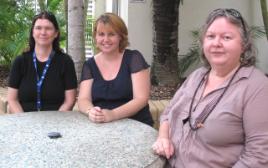CQUni researchers back report into 'Disability Expectations'
Published on 15 Dec, 2011
Media Contact: To arrange interview please contact Davina Taylor 0409 766 225For Immediate Release
CQUniversity researchers Dr Wendy Hillman, Davina Taylor and Julie Mann have supported the findings of the recently released report Disability Expectations: Investing in a better life, a stronger Australia report (2011)...
Drawing on their experience in the disability field and their own research, the Rockhampton-based trio say the information provided in the report is :damning" and that some Australian people with disabilities are experiencing lives that do not meet basic human rights.

Dr Wendy Hillman, Davina Taylor and Julie Mann discuss their support for the report
Click here to View/Download full-sized Image
"We also support the National Disability Insurance Scheme (NDIS)," they say in a shared statement.
"We agree that reform is urgently needed in this country and that the NDIS 10-year vision will see fundamental changes to the disability experience (through changes to how people with disabilities are perceived and supported and how carers are supported). However, these changes will not be possible if all stakeholders are not committed to change.
"We would like to see further support from the community recognising the situation for people with a disability in Australia, as it is depicted in this report.
"The urgent change needed will only occur through initial recognition of how dire the situation currently is and then a cohesive commitment to moving forward to build communities that are based on true inclusion and a better and fairer system for people with a disability."
The Disability Expectations: Investing in a better life, a stronger Australia report (2011) calls for urgent and radical change for support for people with a disability and their families in Australia.
The report states the following salient points:
- One in five people in Australia have a disability
- Over 1.3 million Australians have a severe/profound disability
- Australia ranks 21st out of 29 OECD countries for employment participation for people with a disability
- 45% of people with a disability in Australia live either near of below the poverty line
- The biggest challenge is to provide an environment for change which allows for a cultural shift across all parts of society
- Broader access to economic stability and society is imperative as Australia's overall performance in outcome and cultural terms for people with a disability, their families and carers has been poor
- Policy promises of fairness and basic human rights have gone unfulfilled
- Active pursuit of systemic and societal change in combination with the NDIS is the most obvious way and achievable way of providing an entitlement rather than welfare-based access for people with a disability; changing the cultural and material environment and explicitly changing the way mainstream and specialist disability services interact
Quotes from the report include:
"The regularity with which I meet parents with murder-suicide ideation as they have been unable to fund adequate help for their child is both alarming, but also a marker of the failure of coordination of any service" (Senior Psychiatrist)
"The only way to get help, we were told, was to relinquish our little girl to DoCs (community services). Eventually we could not cope and found ourselves in a world where authorities find it hard to distinguish loving parents from those who abuse their child. It was wrong: (Submission153, p.7 Mad as Hell).
The NDIS is a 10-year commitment by all levels of government to focus on supporting people with a disability to participate in life on equal footing with all other Australians. The NDIS is underpinned by three key platforms:
- The human rights imperative - people with a disability must be given the same rights as all other Australians
- The social imperative - inclusion and participation in everyday life for people living with a disability is imperative but all Australians are a part of the solution and this involves changing embedded attitudes toward people with a disability
- The economic imperative - people with a disability need to be able to earn an income, be productive in the workplace by being supported and encouraged to make real contributions through workforce participation and other viable and meaningful productive avenues that are appropriate
ENDS

